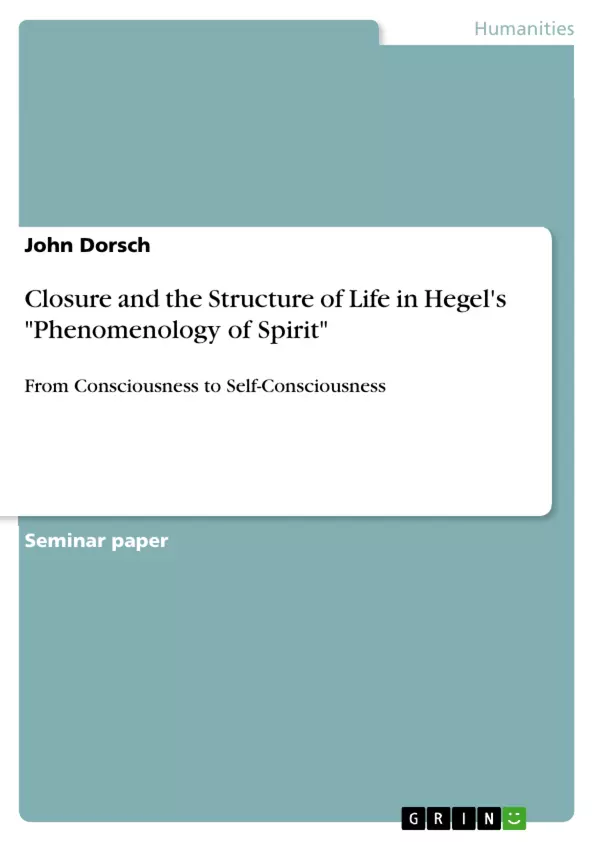The transition from consciousness to self-consciousness in Hegel's "Phenomenology of Spirit" is as complex and controversial as it is as essential and influential. Understanding this transition requires the careful explication of Hegel's conception of life, independence, desire and recognition, as well as his conception of the infinite.
In this paper, Selbstständigkeit, often translated as independence, is interpreted as expressing the Axiom of Closure in Set Theory and the infinite is read through a linguistic conception of identity, with pragmatic and semantic constraints, and its notion in Mathematical Analysis, discussed by Hegel in his Greater Logic. With these rigorous notions and a direct reading of the principle text, a transition is developped from consciousness to self-consciousness that, the paper argues, affords a clearer perspective than currently offered by the literature.
Inhaltsverzeichnis (Table of Contents)
- §1 Introduction
- §2 Selbstständigkeit or Closure
- §3 Life of the Structure of Infinite
- §3.1 Linguistic Identity
- §3.2 Mathematical Infinite
- §3.3 Result
- §4 Desire
- §5 Recognition
Zielsetzung und Themenschwerpunkte (Objectives and Key Themes)
This paper aims to offer a new interpretation of the transition from consciousness to self-consciousness in Hegel's *Phenomenology of Spirit*. It challenges current interpretations by focusing on the neglected concept of *Selbstständigkeit* (often translated as independence) and its relation to life, desire, and recognition. The paper argues that understanding *Selbstständigkeit* as closure, rather than independence, provides a more rigorous foundation for understanding the transition from consciousness to self-consciousness.
- The concept of *Selbstständigkeit* and its role in the dialectic.
- The structure and function of life in Hegel's philosophy.
- The relationship between *Selbstständigkeit*, life, desire, and recognition.
- The use of set theory and mathematical analysis to interpret Hegel's concepts.
- The significance of understanding the transition from consciousness to self-consciousness.
Zusammenfassung der Kapitel (Chapter Summaries)
- §1 Introduction: The introduction outlines the two main points that the paper will address: the neglected concept of *Selbstständigkeit* and the lack of understanding of the structure of life in Hegel's *Phenomenology of Spirit*. The author critiques existing interpretations of *Selbstständigkeit* as "independence" and calls for a more rigorous analysis based on the concept of closure.
- §2 Selbstständigkeit or Closure: This chapter begins by introducing the concept of *Selbstständigkeit* as it first appears in the *Phenomenology*. The author proposes interpreting *Selbstständigkeit* as closure and uses the example of the set of all animals to illustrate how closure is established and disrupted. The chapter argues that the concept of closure provides a more concrete and defined structure for understanding the transition from consciousness to self-consciousness.
- §3 Life of the Structure of Infinite: This chapter explores the concept of life in Hegel's philosophy, arguing that life is equated with the infinite in the earlier chapters on consciousness. The author discusses the role of life in mediating desire and the suspension of conflict between desire and the agent in the chapter on self-consciousness. The chapter examines both linguistic and mathematical conceptions of the infinite to better understand the structure of life.
Schlüsselwörter (Keywords)
The main keywords and focus topics of this paper include *Selbstständigkeit*, closure, life, desire, recognition, infinite, consciousness, self-consciousness, Hegel's *Phenomenology of Spirit*, set theory, mathematical analysis, and dialectic.
Frequently Asked Questions
What is the focus of this paper on Hegel's "Phenomenology of Spirit"?
The paper analyzes the complex transition from consciousness to self-consciousness, focusing on concepts like life, desire, recognition, and specifically "Selbstständigkeit."
How is "Selbstständigkeit" reinterpreted in this study?
Instead of the traditional translation as "independence," the author interprets it as "Closure," drawing parallels to the Axiom of Closure in Set Theory.
What role does mathematics play in this philosophical analysis?
The paper uses rigorous notions from Set Theory and Mathematical Analysis to clarify Hegel's conception of the infinite and the structure of life.
How is the concept of "Life" defined in this context?
Life is viewed as a structure of the infinite that mediates desire and serves as a crucial bridge in the dialectic between consciousness and self-consciousness.
What is the significance of "Desire" and "Recognition" in the paper?
The paper explores how desire and the subsequent need for recognition from another self-consciousness are essential stages in the development of the Hegelian spirit.
- Citar trabajo
- John Dorsch (Autor), 2012, Closure and the Structure of Life in Hegel's "Phenomenology of Spirit", Múnich, GRIN Verlag, https://www.grin.com/document/412274



